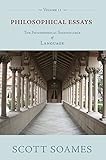Philosophical Essays. Volume 2, Philosophical Essays, Volume 2 ; The Philosophical Significance of Language / Scott Soames.
Material type: TextSeries: Philosophical Essays ; Volume 2Publisher: Princeton, NJ : Princeton University Press, [2009]Copyright date: ©2009Edition: Course BookDescription: 1 online resourceContent type:
TextSeries: Philosophical Essays ; Volume 2Publisher: Princeton, NJ : Princeton University Press, [2009]Copyright date: ©2009Edition: Course BookDescription: 1 online resourceContent type: - 9780691136837
- 9781400833184
- 410.9 22
- P107 .S67eb vol. 2
- online - DeGruyter
- Issued also in print.
| Item type | Current library | Call number | URL | Status | Notes | Barcode | |
|---|---|---|---|---|---|---|---|
 eBook
eBook
|
Biblioteca "Angelicum" Pont. Univ. S.Tommaso d'Aquino Nuvola online | online - DeGruyter (Browse shelf(Opens below)) | Online access | Not for loan (Accesso limitato) | Accesso per gli utenti autorizzati / Access for authorized users | (dgr)9781400833184 |
Frontmatter -- Contents -- The Origins of These Essays -- Introduction -- PART ONE. Reference, Propositions, and Propositional Attitudes -- ESSAY ONE. Direct Reference, Propositional Attitudes, and Semantic Content -- ESSAY TWO. Why Propositions Can't Be Sets of Truth-Supporting Circumstances -- ESSAY THREE. Belief and Mental Representation -- ESSAY FOUR. Attitudes and Anaphora -- PART TWO. Modality -- ESSAY FIVE. The Modal Argument: Wide Scope and Rigidified Descriptions -- ESSAY SIX. The Philosophical Significance of the Kripkean Necessary A Posteriori -- ESSAY SEVEN. Knowledge of Manifest Natural Kinds -- ESSAY EIGHT. Understanding Assertion -- ESSAY NINE. Ambitious Two-Dimensionalism -- ESSAY TEN. Actually -- PART THREE. Truth and Vagueness -- ESSAY ELEVEN. What Is a Theory of Truth? -- ESSAY TWELVE. Understanding Deflationism -- ESSAY THIRTEEN. Higher-Order Vagueness for Partially Defined Predicates -- ESSAY FOURTEEN. The Possibility of Partial Definition -- PART FOUR. Kripke, Wittgenstein, and Following a Rule -- ESSAY FIFTEEN. Skepticism about Meaning: Indeterminacy, Normativity, and the Rule-Following Paradox -- ESSAY SIXTEEN. Facts, Truth Conditions, and the Skeptical Solution to the Rule-Following Paradox -- Index
restricted access online access with authorization star
http://purl.org/coar/access_right/c_16ec
The two volumes of Philosophical Essays bring together the most important essays written by one of the world's foremost philosophers of language. Scott Soames has selected thirty-one essays spanning nearly three decades of thinking about linguistic meaning and the philosophical significance of language. A judicious collection of old and new, these volumes include sixteen essays published in the 1980s and 1990s, nine published since 2000, and six new essays. The essays in Volume 1 investigate what linguistic meaning is; how the meaning of a sentence is related to the use we make of it; what we should expect from empirical theories of the meaning of the languages we speak; and how a sound theoretical grasp of the intricate relationship between meaning and use can improve the interpretation of legal texts. The essays in Volume 2 illustrate the significance of linguistic concerns for a broad range of philosophical topics--including the relationship between language and thought; the objects of belief, assertion, and other propositional attitudes; the distinction between metaphysical and epistemic possibility; the nature of necessity, actuality, and possible worlds; the necessary a posteriori and the contingent a priori; truth, vagueness, and partial definition; and skepticism about meaning and mind. The two volumes of Philosophical Essays are essential for anyone working on the philosophy of language.
Issued also in print.
Mode of access: Internet via World Wide Web.
In English.
Description based on online resource; title from PDF title page (publisher's Web site, viewed 08. Jul 2019)


